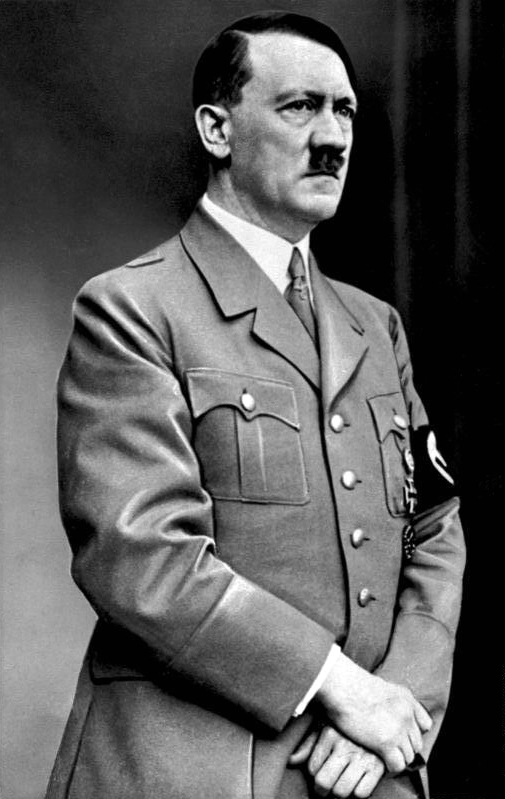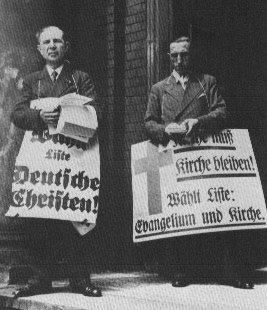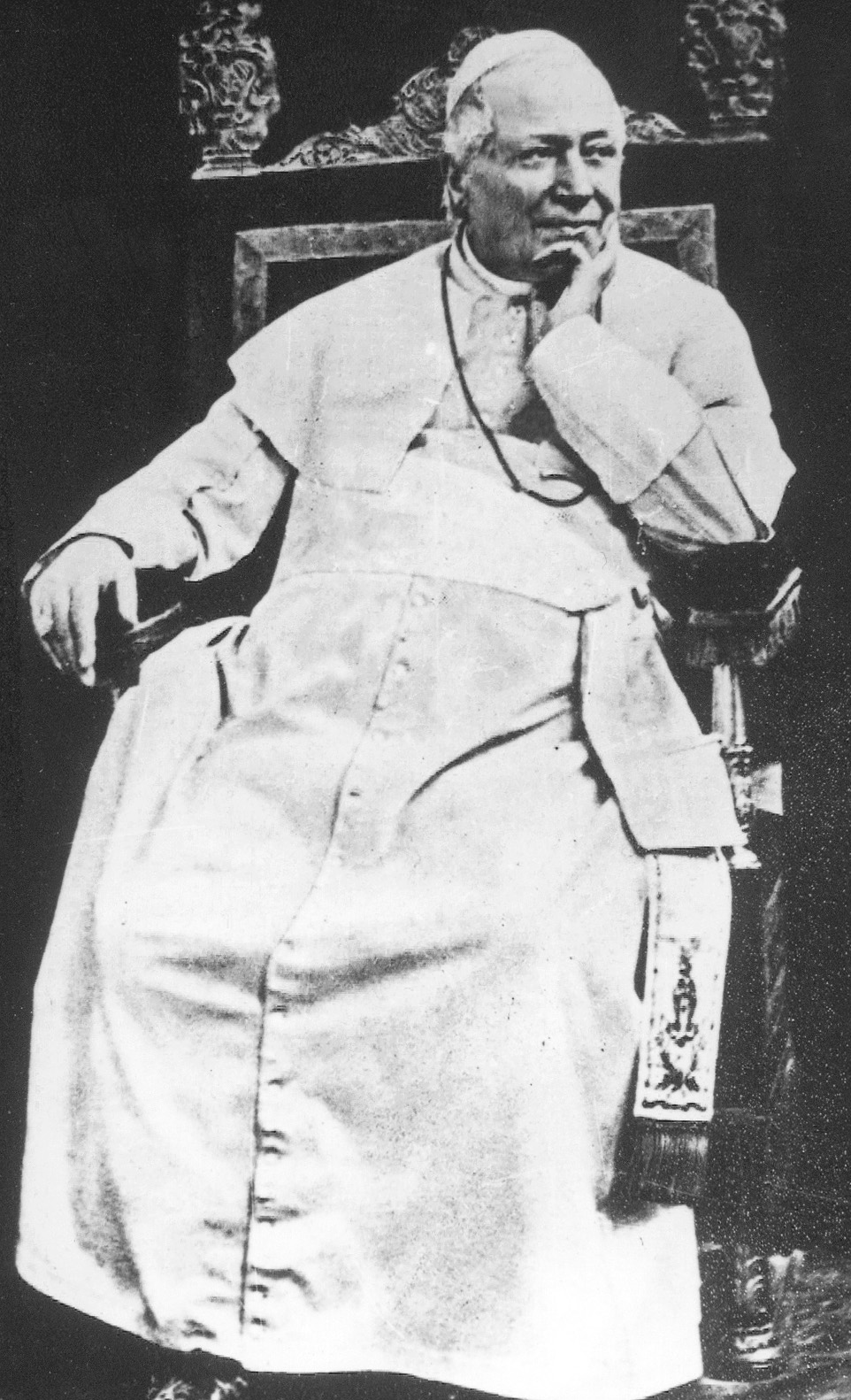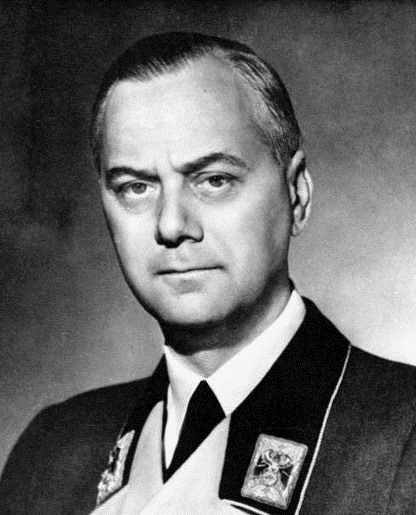|
Kirchenkampf
''Kirchenkampf'' (, lit. 'church struggle') is a German term which pertains to the situation of the Christian churches in Germany during the Nazi period (1933–1945). Sometimes used ambiguously, the term may refer to one or more of the following different "church struggles": # The internal dispute within German Protestantism between the German Christians (''Deutsche Christen'') and the Confessing Church (''Bekennende Kirche'') over control of the Protestant churches; # The tensions between the Nazi regime and the Protestant church bodies; and # The tensions between the Nazi regime and the Roman Catholic Church. When Hitler obtained power in 1933, 95% of Germans were Christian, with 63% being Protestant and 32% being Catholic. Many historians maintain that Hitler's goal in the ''Kirchenkampf'' entailed not only ideological struggle, but ultimately the eradication of the churches. [...More Info...] [...Related Items...] OR: [Wikipedia] [Google] [Baidu] |
German Christians (movement)
German Christians (german: Deutsche Christen) were a pressure group and a movement within the German Evangelical Church that existed between 1932 and 1945, aligned towards the antisemitic, racist and '' Führerprinzip'' ideological principles of Nazism with the goal to align German Protestantism as a whole towards those principles. Their advocacy of these principles led to a schism within 23 of the initially 28 regional church bodies (''Landeskirchen'') in Germany and the attendant foundation of the opposing Confessing Church in 1934. History Antecedents Lutheranism Imperial Germany During the period of the German Empire, before the Weimar Republic, the Protestant churches (''Landeskirchen'') in Germany were divided along state and provincial borders. Each state or provincial church was supported by and affiliated with the regnal house—if it was Protestant—in its particular region; the crown provided financial and institutional support to its church. Churc ... [...More Info...] [...Related Items...] OR: [Wikipedia] [Google] [Baidu] |
Confessing Church
The Confessing Church (german: link=no, Bekennende Kirche, ) was a movement within German Protestantism during Nazi Germany that arose in opposition to government-sponsored efforts to unify all Protestant churches into a single pro-Nazi German Evangelical Church. See drop-down essay on "Unification, World Wars, and Nazism" Demographics The following statistics (as of January 1933 unless otherwise stated) are an aid in understanding the context of the political and theological developments discussed in this article. *Number of Protestants in Germany: 45 million *Number of free church Protestants: 150,000 *Largest regional Protestant church: Evangelical Church of the Old Prussian Union (german: link=no, Evangelische Kirche der altpreußischen Union), with 18 million members, the church strongest in members in the country at the time. *Number of Protestant pastors: 18,000 **Number of these strongly adhering to the "German Christian" church faction as of 1935: 3000 **Number o ... [...More Info...] [...Related Items...] OR: [Wikipedia] [Google] [Baidu] |
Martin Bormann
Martin Ludwig Bormann (17 June 1900 – 2 May 1945) was a German Nazi Party official and head of the Nazi Party Chancellery. He gained immense power by using his position as Adolf Hitler's private secretary to control the flow of information and access to Hitler. He used his position to create an extensive bureaucracy and involve himself as much as possible in the decision making. Bormann joined a paramilitary ''Freikorps'' organisation in 1922 while working as manager of a large estate. He served nearly a year in prison as an accomplice to his friend Rudolf Höss (later commandant of Auschwitz concentration camp) in the murder of Walther Kadow. Bormann joined the Nazi Party in 1927 and the ''Schutzstaffel'' (SS) in 1937. He initially worked in the party's insurance service, and transferred in July 1933 to the office of Deputy Führer Rudolf Hess, where he served as chief of staff. Bormann gained acceptance into Hitler's inner circle and accompanied him everywhere, provid ... [...More Info...] [...Related Items...] OR: [Wikipedia] [Google] [Baidu] |
Kulturkampf
(, 'culture struggle') was the conflict that took place from 1872 to 1878 between the Catholic Church led by Pope Pius IX and the government of Prussia led by Otto von Bismarck. The main issues were clerical control of education and ecclesiastical appointments. A unique feature of , compared to other struggles between the state and the Catholic Church in other countries, was Prussia's anti-Polish component. By extension the term is sometimes used to describe any conflict between secular and religious authorities or deeply opposing values, beliefs between sizable factions within a nation, community, or other group. Background Europe and the Catholic Church Under the influence of new emerging philosophies and ideologies, such as the enlightenment, realism, positivism, materialism, nationalism, secularism, and liberalism, the role of religion in society and the relationship between society and established churches underwent profound changes in the 18th and 19th centuries. Po ... [...More Info...] [...Related Items...] OR: [Wikipedia] [Google] [Baidu] |
Alfred Rosenberg
Alfred Ernst Rosenberg ( – 16 October 1946) was a Baltic German Nazi theorist and ideologue. Rosenberg was first introduced to Adolf Hitler by Dietrich Eckart and he held several important posts in the Nazi government. He was the head of the NSDAP Office of Foreign Affairs during the entire rule of Nazi Germany (1933–1945), and led Amt Rosenberg ("Rosenberg's bureau"), an official Nazi body for cultural policy and surveillance, between 1934 and 1945. During World War II, Rosenberg was the head of the Reich Ministry for the Occupied Eastern Territories (1941–1945). After the war, he was convicted of crimes against peace; planning, initiating and waging wars of aggression; war crimes; and crimes against humanity at the Nuremberg trials in 1946. He was sentenced to death and executed on 16 October 1946. The author of a seminal work of Nazi ideology, '' The Myth of the Twentieth Century'' (1930), Rosenberg is considered one of the main authors of key Nazi ide ... [...More Info...] [...Related Items...] OR: [Wikipedia] [Google] [Baidu] |
Nazi Germany
Nazi Germany (lit. "National Socialist State"), ' (lit. "Nazi State") for short; also ' (lit. "National Socialist Germany") (officially known as the German Reich from 1933 until 1943, and the Greater German Reich from 1943 to 1945) was the German Reich, German state between 1933 and 1945, when Adolf Hitler and the Nazi Party controlled the country, transforming it into a dictatorship. Under Hitler's rule, Germany quickly became a totalitarian state where nearly all aspects of life were controlled by the government. The Third Reich, meaning "Third Realm" or "Third Empire", alluded to the Nazi claim that Nazi Germany was the successor to the earlier Holy Roman Empire (800–1806) and German Empire (1871–1918). The Third Reich, which Hitler and the Nazis referred to as the Thousand-Year Reich, ended in May 1945 after just 12 years when the Allies of World War II, Allies defeated Germany, End of World War II in Europe, ending World War II in Europe. On 30 January 1933, H ... [...More Info...] [...Related Items...] OR: [Wikipedia] [Google] [Baidu] |
Christianity In Germany
Christianity is the largest religion in Germany. It was introduced to the area of modern Germany by 300 AD, while parts of that area belonged to the Roman Empire, and later, when Franks and other Germanic tribes converted to Christianity from the fifth century onwards. The area became fully Christianized by the time of Charlemagne in the eighth and ninth century. After the Reformation started by Martin Luther in the early 16th century, many people left the Catholic Church and became Protestant, mainly Lutheran and Calvinist. In 2021, around 52.7% of the population were Christians among them 49.7% members of the two large Christian churches.Numbers and Facts about Church Life in the EKD 2021 Report [...More Info...] [...Related Items...] OR: [Wikipedia] [Google] [Baidu] |
Adolf Hitler
Adolf Hitler (; 20 April 188930 April 1945) was an Austrian-born German politician who was dictator of Nazi Germany, Germany from 1933 until Death of Adolf Hitler, his death in 1945. Adolf Hitler's rise to power, He rose to power as the leader of the Nazi Party, becoming the Chancellor of Germany, chancellor in 1933 and then taking the title of in 1934. During his dictatorship, he initiated European theatre of World War II, World War II in Europe by invasion of Poland, invading Poland on 1 September 1939. He was closely involved in military operations throughout the war and was central to the perpetration of the Holocaust: the genocide of Holocaust victims, about six million Jews and millions of other victims. Hitler was born in Braunau am Inn in Austria-Hungary and was raised near Linz. He lived in Vienna later in the first decade of the 1900s and moved to Germany in 1913. He was decorated during his Military career of Adolf Hitler, service in the German Army in Worl ... [...More Info...] [...Related Items...] OR: [Wikipedia] [Google] [Baidu] |
Anton Gill
Anton Gill (born in 1948) is a British writer of historical fiction and nonfiction. He won the H. H. Wingate Award for non-fiction for ''The Journey Back From Hell'', an account of the lives of survivors after their liberation from Nazi concentration camps. Personal life Gill was born in Ilford, Essex, and educated at Chigwell School and Clare College, Cambridge. He started writing professionally in 1984 after fifteen years in the theatre. He lives in London with his wife, the actress Marji Campi. Other than writing, his chief interests are travel and art. Career Gill worked as an actor and as a director in the theatre (especially at the Royal Court Theatre in London), for the Arts Council, and for the BBC and TV-am (as writer and producer) before turning to full-time writing.Anton Gill Fantastic Fiction He has been a ... [...More Info...] [...Related Items...] OR: [Wikipedia] [Google] [Baidu] |
Judeo-Christian
The term Judeo-Christian is used to group Christianity and Judaism together, either in reference to Christianity's derivation from Judaism, Christianity's borrowing of Jewish Scripture to constitute the "Old Testament" of the Christian Bible, or due to the parallels or commonalities in Judaeo-Christian ethics shared by the two religions. The term "Judæo Christian" first appeared in the 19th century as a word for Jewish converts to Christianity. In the United States the term was widely used during the Cold War in an attempt to suggest that the United States had a unified American identity which was opposed to communism. Theologian and author Arthur A. Cohen, in ''The Myth of the Judeo-Christian Tradition'', questioned the theological validity of the Judeo-Christian concept, instead, he suggested that it was essentially an invention of American politics. The use of Abrahamic religions as a term for the common grouping of faiths which are attributed to Abraham, the Baháʼ� ... [...More Info...] [...Related Items...] OR: [Wikipedia] [Google] [Baidu] |
Ancient Era
Ancient history is a time period from the beginning of writing and recorded human history to as far as late antiquity. The span of recorded history is roughly 5,000 years, beginning with the Sumerian cuneiform script. Ancient history covers all continents inhabited by humans in the period 3000 BCAD 500. The three-age system periodizes ancient history into the Stone Age, the Bronze Age, and the Iron Age, with recorded history generally considered to begin with the Bronze Age. The start and end of the three ages varies between world regions. In many regions the Bronze Age is generally considered to begin a few centuries prior to 3000 BC, while the end of the Iron Age varies from the early first millennium BC in some regions to the late first millennium AD in others. During the time period of ancient history, the world population was already exponentially increasing due to the Neolithic Revolution, which was in full progress. While in 10,000 BC, the world population stood ... [...More Info...] [...Related Items...] OR: [Wikipedia] [Google] [Baidu] |
Jews
Jews ( he, יְהוּדִים, , ) or Jewish people are an ethnoreligious group and nation originating from the Israelites Israelite origins and kingdom: "The first act in the long drama of Jewish history is the age of the Israelites""The people of the Kingdom of Israel and the ethnic and religious group known as the Jewish people that descended from them have been subjected to a number of forced migrations in their history" and Hebrews of historical Israel and Judah. Jewish ethnicity, nationhood, and religion are strongly interrelated, "Historically, the religious and ethnic dimensions of Jewish identity have been closely interwoven. In fact, so closely bound are they, that the traditional Jewish lexicon hardly distinguishes between the two concepts. Jewish religious practice, by definition, was observed exclusively by the Jewish people, and notions of Jewish peoplehood, nation, and community were suffused with faith in the Jewish God, the practice of Jewish (religious ... [...More Info...] [...Related Items...] OR: [Wikipedia] [Google] [Baidu] |








